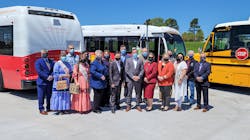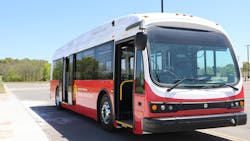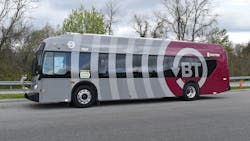Cherokee Nation, VIA Metropolitan Transit and Blacksburg Transit launch zero-emission buses
Three transit providers will be launching or making plans to incorporate a combined 14 new zero-emission transit buses in three states as part of their celebrations surrounding Earth Day.
On April 19, the Cherokee Nation unveiled two battery-electric transit buses and an electric school bus. The Cherokee Nation says the two transit buses will transport employees and tribal citizens to work and tribal health centers, while the new school bus will transport students to Sequoyah High School in Tahlequah, Okla.
The two Proterra-made transit buses and chargers were funded by a $1.3 million Federal Transit Administration grant through the FY18 Low or No-Emission Bus Program. The buses will replace existing diesel-powered buses that serve routes between Tahlequah and the Catoosa-area and West Siloam Springs and Stilwell.
In San Antonio, Texas, VIA Metropolitan Transit will be adding eight 40-foot GILLIG-made buses to its fleet when they arrive in October 2022. The battery-electric buses will replace VIA’s fleet of eight downtown trolleys that were purchased in 2005 and add to the transit authority’s diverse fleet, which includes compressed natural gas (CNG) fuel, diesel-electric hybrid, electric, diesel and propane vehicles.
VIA announced a new fuel supply partnership earlier this year with CPS Energy to provide Renewable Natural Gas, which VIA says is a significant step forward in the supply of renewable fuel for use in its CNG fleet.
“As electric bus technology improves, it opens up new opportunities for VIA to provide sustainable transit services for our growing region that now include renewable fuel and battery power options to boost our clean energy initiatives,” VIA President/CEO Jeffrey C. Arndt said. “A significant reduction in harmful emissions improves air quality and an anticipated reduction of maintenance and fuel costs over conventional-powered buses. [It] also helps lower operational costs so that we can invest in more service for our customers.”
Blacksburg Transit was one of three transit agencies to be awarded funding for the deployment of electric buses in 2019 by the Virginia Department of Rail and Public Transportation and the Department of Environmental Quality. The $3.3-million grant for the buses, as well as fast chargers, was supplemented with additional funding from the town of Blacksburg and Virginia Tech.
“These buses are just the beginning of what will someday be a fully electric fleet of buses. Our goal is that in three to four years, half of the entire fleet will be electric, and we will be 100 percent electric in about 10 years depending on funding. This is a large step towards reducing our carbon footprint while also reducing our dependence on fossil fuels,” said Blacksburg Transit Director Tom Fox.
About the Author

Mischa Wanek-Libman
Group Editorial Director
Mischa Wanek-Libman is director of communications with Transdev North America. She has more than 20 years of experience working in the transportation industry covering construction projects, engineering challenges, transit and rail operations and best practices.
Wanek-Libman has held top editorial positions at freight rail and public transportation business-to-business publications including as editor-in-chief and editorial director of Mass Transit from 2018-2024. She has been recognized for editorial excellence through her individual work, as well as for collaborative content.
She is an active member of the American Public Transportation Association's Marketing and Communications Committee and served 14 years as a Board Observer on the National Railroad Construction and Maintenance Association (NRC) Board of Directors.
She is a graduate of Drake University in Des Moines, Iowa, where she earned a Bachelor of Arts degree in Journalism and Mass Communication.


